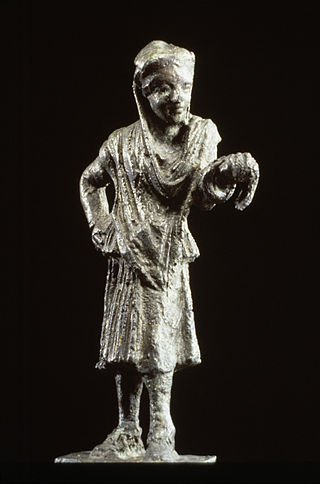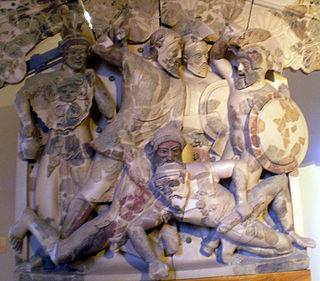Tragedian refers to:
- A term for Greek playwrights who wrote tragedies. See Greek Tragedy.
- The name of the roving acting company in Tom Stoppard's Rosencrantz and Guildenstern Are Dead .
Tragedian refers to:

Aeschylus was an ancient Greek tragedian often described as the father of tragedy. Academic knowledge of the genre begins with his work, and understanding of earlier Greek tragedy is largely based on inferences made from reading his surviving plays. According to Aristotle, he expanded the number of characters in the theatre and allowed conflict among them. Formerly, characters interacted only with the chorus.

Euripides was a tragedian of classical Athens. Along with Aeschylus and Sophocles, he is one of the three ancient Greek tragedians for whom any plays have survived in full. Some ancient scholars attributed ninety-five plays to him, but the Suda says it was ninety-two at most. Of these, eighteen or nineteen have survived more or less complete. There are many fragments of most of his other plays. More of his plays have survived intact than those of Aeschylus and Sophocles together, partly because his popularity grew as theirs declined—he became, in the Hellenistic Age, a cornerstone of ancient literary education, along with Homer, Demosthenes, and Menander.

Tragedy is a genre of drama based on human suffering and, mainly, the terrible or sorrowful events that befall a main character. Traditionally, the intention of tragedy is to invoke an accompanying catharsis, or a "pain [that] awakens pleasure,” for the audience. While many cultures have developed forms that provoke this paradoxical response, the term tragedy often refers to a specific tradition of drama that has played a unique and important role historically in the self-definition of Western civilization. That tradition has been multiple and discontinuous, yet the term has often been used to invoke a powerful effect of cultural identity and historical continuity—"the Greeks and the Elizabethans, in one cultural form; Hellenes and Christians, in a common activity," as Raymond Williams puts it.

In Greek mythology, Melpomene is the Muse of tragedy in Greek mythology. She is described as the daughter of Zeus and Mnemosyne along with the other Muses, and she is often portrayed with a tragic theatrical mask.
Diogenes was a Greek philosopher and one of the founders of Cynic philosophy.

A theatrical culture flourished in ancient Greece from 700 BC. At its centre was the city-state of Athens, which became a significant cultural, political, and religious place during this period, and the theatre was institutionalised there as part of a festival called the Dionysia, which honoured the god Dionysus. Tragedy, comedy, and the satyr play were the three dramatic genres emerged there. Athens exported the festival to its numerous colonies. Modern Western theatre comes, in large measure, from the theatre of ancient Greece, from which it borrows technical terminology, classification into genres, and many of its themes, stock characters, and plot elements.

Greek tragedy is one of the three principal theatrical genres from Ancient Greece and Greek inhabited Anatolia, along with comedy and the satyr play. It reached its most significant form in Athens in the 5th century BC, the works of which are sometimes called Attic tragedy.

The satyr play is a form of Attic theatre performance related to both comedy and tragedy. It preserves theatrical elements of dialogue, actors speaking verse, a chorus that dances and sings, masks and costumes. Its relationship to tragedy is strong; satyr plays were written by tragedians, and satyr plays were performed in the Dionysian festival following the performance of a group of three tragedies. The satyr play's mythological-heroic stories and the style of language are similar to that of the tragedies. Its connection with comedy is also significant – it has similar plots, titles, themes, characters, and happy endings. The remarkable feature of the satyr play is the chorus of satyrs, with their costumes that focus on the phallus, and with their language, which uses wordplay, sexual innuendos, references to breasts, farting, erections, and other references that do not occur in tragedy. As Mark Griffith points out, the satyr play was "not merely a deeply traditional Dionysiac ritual, but also generally accepted as the most appropriate and satisfying conclusion to the city’s most complex and prestigious cultural event of the year."
Aphareus was an ancient Greek tragedian and orator. He attended the school of Isocrates, along with Theodectes. He was the son of Hippias the sophist, and the adopted son of Isocrates, left behind him thirty-seven tragedies, and had been successful in winning four victories. None of his works have been found whole.

The Theban Cycle is a collection of four lost epics of ancient Greek literature which tells the mythological history of the Boeotian city of Thebes. They were composed in dactylic hexameter verse and believed to be recorded between 750 and 500 BC. The epics took place before the Trojan War and centered around the Theban royal family.

Senecan tragedy refers to a set of ten ancient Roman tragedies, eight of which were probably written by the Stoic philosopher and politician Lucius Annaeus Seneca. Senecan tragedy, much like any particular type of tragedy, had specific characteristics to help classify it. The three characteristics of Senecan tragedy were: five separate acts, each with a Chorus; recounting of ‘horrors’ and violent acts, which are usually done off-stage; and some sort of parallel of the violence that occurred. Only the Phoenissae departs from the five act structure. In the English literary canon, Seneca appears as a major influence on later texts about revenge, such as Titus Andronicus and The Crying of Lot 49.

Rhesus is an Athenian tragedy that belongs to the transmitted plays of Euripides. Its authorship has been disputed since antiquity, and the issue has invested modern scholarship since the 17th century when the play's authenticity was challenged, first by Joseph Scaliger and subsequently by others, partly on aesthetic grounds and partly on account of peculiarities in the play's vocabulary, style and technique. The conventional attribution to Euripides remains controversial.
Phrynichus, son of Polyphradmon and pupil of Thespis, was one of the earliest of the Greek tragedians. Some ancients regarded him as the real founder of tragedy. Phrynichus is said to have died in Sicily. His son Polyphrasmon was also a playwright.

The Apollonian and the Dionysian are philosophical and literary concepts represented by a duality between the figures of Apollo and Dionysus from Greek mythology. Its popularization is widely attributed to the work The Birth of Tragedy by Friedrich Nietzsche, though the terms had already been in use prior to this, such as in the writings of poet Friedrich Hölderlin, historian Johann Joachim Winckelmann, and others. The word Dionysian occurs as early as 1608 in Edward Topsell's zoological treatise The History of Serpents. The concept has since been widely invoked and discussed within Western philosophy and literature.

The architectural form of theatre in Rome has been linked to later, more well-known examples from the 1st century BC to the 3rd Century AD. The theatre of ancient Rome referred to a period of time in which theatrical practice and performance took place in Rome. The tradition has been linked back even further to the 4th century BC, following the state’s transition from monarchy to republic. Theatre during this era is generally separated into genres of tragedy and comedy, which are represented by a particular style of architecture and stage play, and conveyed to an audience purely as a form of entertainment and control. When it came to the audience, Romans favored entertainment and performance over tragedy and drama, displaying a more modern form of theatre that is still used in contemporary times.

Drama is the specific mode of fiction represented in performance: a play, opera, mime, ballet, etc., performed in a theatre, or on radio or television. Considered as a genre of poetry in general, the dramatic mode has been contrasted with the epic and the lyrical modes ever since Aristotle's Poetics —the earliest work of dramatic theory.
Alcaeus, the son of Miccus, was an Athenian comic poet. His comedies marked the transition between Old Comedy and Middle Comedy. In 388 BC, his play Pasiphae was awarded the fifth place prize in the same contest that Aristophanes exhibited his play Plutus.
Philocles, was an Athenian tragic poet during the 5th century BC. Through his mother, Philopatho, he had three famous uncles: Aeschylus, the famous poet, Cynaegirus, hero of the battle of Marathon, and Ameinias, hero of the battle of Salamis. The Suda claims that Philocles was the father of the tragic playwright Morsimus, who was in turn the father of the tragedian Astydamas.
Euphorion was the son of the Greek tragedian Aeschylus, and himself an author of tragedies. He is known solely for his victory over Sophocles and Euripides in the Dionysia of 431 BC. According to the 10th century AD Suda, he won four victories by producing Aeschylus' plays, but it is suggested that this may have been a single victory with four plays.
Diogenes of Athens may refer to: